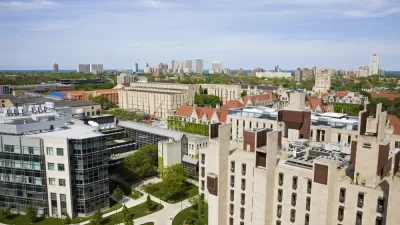As public-private partnerships to invest in aged urban infrastructure gain in popularity in Chicago, and across the country, Christopher Weber asks who will fund the improvements unaligned with corporate interests.
With its recently announced $7 billion plan for private investment to help fund a raft of infrastructure improvement projects, Chicago (led by Mayor Rahm Emanuel) has leapt to the front of the rush to "get corporate America to pay for something once funded by tax dollars alone." An attractive solution to funding necessary improvements at a time when city budgets are stretched to the breaking point and the federal government is unable to agree on spending priorities, such partnerships have an inherent downside, argues Weber:
"The problem is that the public-private 'partnerships,' as Emanuel outlines them, are tilted toward the private side. They let corporate interests drive public investment. Projects that fail to align with the interests of private funders go begging."
As an example, Weber points to 63rd Street, "once a mecca of culture and business on Chicago's South Side" that is now a no-man's land.
"63rd Street shows how big that hole is. What company is going to invest in building affordable housing and livable communities here? These honorable causes stand to be big losers in the era of the public-private partnership. Not only has Emanuel refused to invest here-he's actively cutting back on the city's role in the neighborhood...Realistically, City Halls in Chicago and nationwide must invest in depopulated districts like 63rd Street because no one else will."
FULL STORY: From Chicago’s 63rd Street: Where’s the Public Interest in Public-Private Partnerships?

Maui's Vacation Rental Debate Turns Ugly
Verbal attacks, misinformation campaigns and fistfights plague a high-stakes debate to convert thousands of vacation rentals into long-term housing.

Planetizen Federal Action Tracker
A weekly monitor of how Trump’s orders and actions are impacting planners and planning in America.

In Urban Planning, AI Prompting Could be the New Design Thinking
Creativity has long been key to great urban design. What if we see AI as our new creative partner?

King County Supportive Housing Program Offers Hope for Unhoused Residents
The county is taking a ‘Housing First’ approach that prioritizes getting people into housing, then offering wraparound supportive services.

Researchers Use AI to Get Clearer Picture of US Housing
Analysts are using artificial intelligence to supercharge their research by allowing them to comb through data faster. Though these AI tools can be error prone, they save time and housing researchers are optimistic about the future.

Making Shared Micromobility More Inclusive
Cities and shared mobility system operators can do more to include people with disabilities in planning and operations, per a new report.
Urban Design for Planners 1: Software Tools
This six-course series explores essential urban design concepts using open source software and equips planners with the tools they need to participate fully in the urban design process.
Planning for Universal Design
Learn the tools for implementing Universal Design in planning regulations.
planning NEXT
Appalachian Highlands Housing Partners
Mpact (founded as Rail~Volution)
City of Camden Redevelopment Agency
City of Astoria
City of Portland
City of Laramie




























